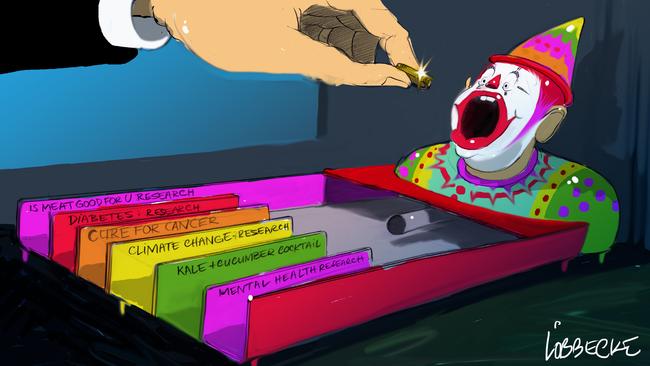
HOW happy would Michael Moore have been with last week’s budget?
As an advocate for public health, Moore must have been cock-a-hoop that $20 billion has been set aside to cure cancer, schizophrenia and countless other stubborn afflictions.
The cucumber, kale and celery cocktails must have been flowing like wine at the Public Health Association Australia’s headquarters.
Nope. The budget failed to recognise “the health and economic costs associated with the growing burden of chronic disease”, the PHAA chief complained. Cuts in spending “will effectively kick people while they are down and result in an increasing burden on the health system over time”.
It is not entirely clear which budget papers Moore had been sent, but they clearly weren’t the same ones received by Ian Olver. The Cancer Council’s chief executive predicts that at least 35,000 deaths will be prevented thanks to the $95.9 million allocated for bowel cancer screening.
Olver was thrilled to bits with the Medical Research Future Fund, saying, “We look forward to working closely with the Abbott government on its research program.” That presumably means he would like a slice of it, and let’s hope he gets it.
Moore, on the other hand, knows the jig is up. The wristband-wearing, grant-devouring, press release-issuing class fared particularly badly in Joe Hockey’s budget, and its members know full well that there is more pain to come.
There will be nothing from the research futures fund to squander on Moore’s pet projects, such as needle exchange programs for prisons, US prohibition-style measures against meat, booze and sugar, fighting climate change and capitalism in general.
The Abbott government, for its part, is intent on stamping out the preventive health funding rort, at least those bits of it that it can. Its first budget has wedged the food and health activists, separating those who want to stamp out the things that actually kill people, such as Creutzfeldt-Jakob disease or diabetes, from those who merely run symbolic moral crusades.
The cause of public health has been a honey pot for virtue-seekers since it took hold of middle-class imaginations in the mid-19th century.
In its more lucid moments, the movement has achieved a great deal — skewering the streets of Sydney, for example, immunising children, keeping malaria at bay, discouraging smoking and encouraging safe sex.
When it turns silly, however, it turns really silly, as a trawl through the PHAA’s website reveals. When it is done with stamping out things, it demands immediate action.
The federal government must “take action now” to reduce carbon emissions. How? By continuing to fund Tim Flannery’s Climate Change Authority. Why? Because “the health consequences of climate change are extensive … more frequent heatwaves and floods, more intense fire seasons and droughts … changes to soil fertility … psychological consequences …” etc, etc.
The PHAA insists that health star ratings labels be put on the front of packaged food “as quickly as possible”.
Assistant Health Minister Fiona Nash has sensibly asked for the evidence that this ridiculous and patronising scheme will actually work, but the PHAA’s Heather Yeatman is impatient, saying “given the extent of the obesity epidemic in Australia and diet-related illnesses including diabetes, cancer and cardiovascular disease, there is no time to waste”.
The PHAA’s website is the online equivalent of Clive Palmer’s toxic tailings dam in Townsville — a repository of outrage that is eventually bound to spill over.
“The PHAA is outraged by today’s flippant dismissal of the food health star rating initiative by a government MP,” a press release announced in February.
“Queensland MP Ewan Jones joked the initiative should be scrapped because it wouldn’t stop him eating chocolate ice cream.”
When former attorney-general Nicola Roxon took exception to a picture of a kangaroo on advertisements for Winfield cigarettes in France, and declared that it was “outrageous”, the humourless Moore could not but agree.
“It’s a strong insult to Australia that you would use our symbol of nationhood to lure people into smoking,” he told Medical Observer.
There is precious little outrage, however, about inadequate mental health provision, or any sympathy for the 64,000 Australians with a psychotic illness, for whom bodies such as the Schizophrenia Research Institute would like to find a cure.
Ditto the estimated 250,000 dementia sufferers, or the 120,000-odd Australians who will be diagnosed with cancer this year.
Which just goes to confirm that the PHAA is not so much concerned by sick people as it is by fashionable causes.
It objects to the budget not because of what it contains but because of who delivered it.
As Moore explained to a Productivity Commission inquiry in 2007: “It’s important, I think, for us to identify the Public Health Association of Australia is interested in public health not just as a matter as the absence of sickness but actually dealing with people in a state of wellbeing.
“So our approach is to ensure as far as we can that we develop policies and we advocate to that end.”
Ensuring “a state of wellbeing” should not be confused with the real job of health professionals, which is to make and keeppeople well.
But, then, the PHAA is not a health body.
It is an advocacy body that attempts to bestow respectability on illiberal inner-city dinner party prejudices by explaining that by banning this or taxing that we’ll all live happier and healthier lives.
It takes contentious issues such as reforming abortion laws, opposing nuclear power, income equalisation, vegetarianism and disability funding and reduces them to questions of public health.
And it is a con.
Why, back in 2007, Moore stood up at the Productivity Commission to fight for the right for mothers to breast-feed. Paid parental leave, funded by the government, should be extended to six months, argued Moore, in line with predicted changes to the International Labour Organisation’s ruling.
In the budget, notoriously, the Abbott government did just that. Any thanks?
None. Zero. Zilch. Not a vegan, soy-protein sausage.


